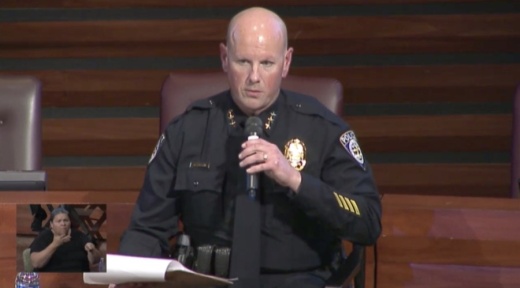During a town hall on June 15, Police Chief David Shilson went point by point through each of the proposals from the #8CantWait campaign, which encourages police departments to enact more restrictive use-of-force policies in order to reduce police killings.
The town hall comes two weeks after the city’s first peaceful protest to promote racial equity and ban police brutality.
Ban chokeholds and strangleholds
The first policy of the public advocacy group #8CantWait proposes police departments ban chokeholds and strangleholds.
Shilson said chokeholds and strangleholds are currently not approved by Frisco Police and would only be appropriate in a “deadly force” situation where an officer might be fighting for his or her life.
“What you saw in Minneapolis would never be approved by this police department,” Shilson said at the town hall. “And we have several different policies that actually prohibit that practice.”
Require de-escalation
The campaign's second proposed policy requires de-escalation training. De-escalation is incorporated in several aspects of Frisco Police Department’s training, Shilson said.
Several department members have also been trained to instruct de-escalation training for future generations of officers, he said.
Require warning before shooting
The third policy proposes requiring officers to give a verbal warning before shooting, but Shilson said this is situational for Frisco Police.
“It’s not something we can put in policy that you have to give a warning before using deadly force,” he said. “It could put members of our force and the public at risk requiring an absolute policy.”
Shilson said an active shooter scenario is an example of when it would not be ideal for an officer to give a warning as it could risk more lives.
Requires all alternatives before shooting
The fourth policy proposes requiring officers to exhaust all alternatives before shooting, including using non-force and less-lethal force options. Shilson said using deadly force is the department’s “last resort.”
“We have policies that outline when [using deadly force] is appropriate,” he said. “But we certainly do make every attempt to exhaust all other options available.”
Duty to intervene
The fifth policy proposes officers be required to intervene and stop excessive force used by other officers and report incidents immediately.
While the department had this language in its policy, Shilson said Frisco Police updated the policy’s language last week to further clarify.
“It’s been our policy since I came here,” he said. “But we put in more specific language to make it even more clear that officers, no matter their rank, no matter their experience level, if they see something that is outside law and policy, they have an absolute obligation to intervene.”
Shilson added the department has invested in extra supervisors to monitor and check on officers.
“This is proactive supervision, [such as] randomly checking videos and being out there being on the road watching what officers are doing to ensure they’re following law and policy,” he said.
Ban shooting at moving vehicles
The sixth policy aims to ban officers from shooting at moving vehicles in all cases.
Shilson said it has always been the department’s policy to not allow shooting at moving vehicles unless it is a deadly force scenario.
Require use of force continuum
The seventh policy establishes a force continuum that restricts the most severe types of force to the most extreme situations and creates clear policy restrictions on the use of each police weapon and tactic.
“We’ve always had that, and it’s evolved over time,” Shilson said. “We haven’t always had Tasers, and now our officers carry Tasers, so we’ve incorporated that in.”
Require comprehensive reporting
The eighth and last proposed policy requires officers to report each time they use force or threaten to use force against civilians. Shilson said every use of force that is done is reviewed all the way up the Frisco Police Department’s chain of command.
Additionally, Shilson said the department has a Response to Resistance Review Board that reviews each use, and the results are published in an annual report.
In 2019, Shilson said Frisco Police had more than 128,000 calls for service. A level of force was used in 400 of those instances, he said.
“You’re talking about less than 1%, which I think is a testament to our officers’ ability to communicate, de-escalate things and respond with proper training,” Shilson said.





